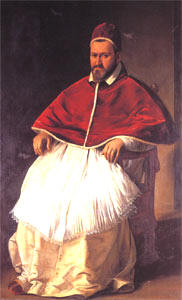 Baronius and St. Robert Bellarmine were among those considered as
successors of Leo XI, but finally the cardinals chose Camillo Borghese, who
took the name Paul V. Camillo Borghese was born at Rome on September 17,
1550. His family, originally from Siena, claimed relationship with the
great mystic, St. Catherine. Trained at Perugia and Padua, Camillo became
an expert canon lawyer. In 1596 Clement VIII made him a cardinal and vicar
of Rome. No party man, he was agreeable to all factions.
Baronius and St. Robert Bellarmine were among those considered as
successors of Leo XI, but finally the cardinals chose Camillo Borghese, who
took the name Paul V. Camillo Borghese was born at Rome on September 17,
1550. His family, originally from Siena, claimed relationship with the
great mystic, St. Catherine. Trained at Perugia and Padua, Camillo became
an expert canon lawyer. In 1596 Clement VIII made him a cardinal and vicar
of Rome. No party man, he was agreeable to all factions.
Paul V was a vigorous fifty-two when elected. Pious and learned, charitable
and hard-working, he made an excellent pastor. Being a canon lawyer, he
believed rules were made to be kept, and his rigorous enforcement of Trent
reform decrees caused a deal of rustling in Roman ecclesiastical circles.
The same respect for law made him a terror to evildoers. Like Sixtus V he
was concerned to put down banditry.
Paul V had a hard time with Venice. The republic's pride seemed to swell in
proportion as its power decreased. It had defied church law to forbid the
erection of new church buildings and to arrest two clerics. Paul tried to
bring the republic to reason, but when the oligarchs stubbornly defied all
threats, the Pope excommunicated doge and senate and placed Venice under
interdict. The Venetian government defied the interdict by ordering priests
to go ahead with services, and when Capuchins, Jesuits, and Theatines
refused, the oligarchs expelled them. This quarrel almost flamed into a
European war. When Paul tried to raise an army, England and Holland
threatened to intervene in favor of Venice. Meanwhile a war of words was
bitterly fought. Paolo Sarpi, a Servite who combined brilliant scholarship
with a most peculiar notion of Catholic loyalty, wrote furiously against
the Pope, while Baronius and St. Robert Bellarmine brought their vast
learning into play to defend him. After a year of struggle, shrewd King
Henry IV of France mediated to bring peace. Venice gave in as little as
possible but enough to justify the Pope in releasing the republic from
censure.
Wily King James of England also gave trouble to Paul. He issued a new oath
of allegiance which, cunningly worded, was considered acceptable by some
Catholics. Paul V had to condemn this oath twice, and even so, it made for
division among the English Catholics.
A great patron of art, Paul V succeeded in having Carlo Maderna finally
bring the construction of St. Peter's to a grandiose finish. Paul had one
defect, nepotism Too fond of his relatives, he made the fortune of the
Borghese family. He was, however, a broad-minded and energetic leader in
mission activity. He did not discourage the daring innovations of men like
Matteo Ricci and Robert de Nobili.
Paul V died of a stroke on January 28,1621.
Excerpted from "Popes
Through the Ages" by Joseph Brusher, S.J.

